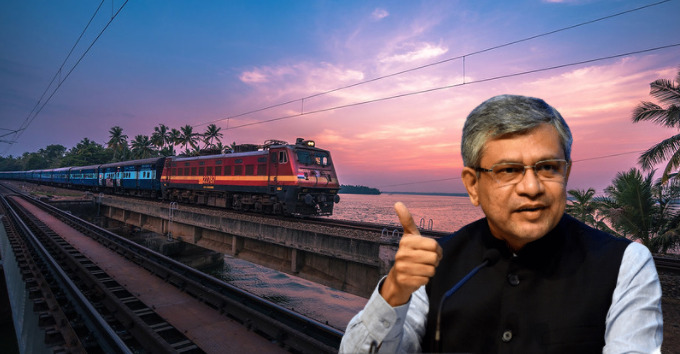- The new order reverses the December 2019 decision by the previous Railway minister, Piyush Goyal.
- Earlier, the Railway board used to screen the tenders from PSUs, and then the winning PSU would float a tender among the contractors in the open market.
- A look at Piyush Goyal’s glaring tenure, which turned around the Railway Ministry like never before, would be sufficient to acknowledge the tedious task Minister Vaishnaw has been entrusted with.
In a decision that will force the Public Sector Undertakings under the Railway Ministry to become more efficient and bring more competition, the Railway board has decided to open up railway contracts for private players. The new order reverses the December 2019 decision by the previous Railway minister, Piyush Goyal.
“The policy approved by the Board, in their meeting held on 19.12.2019 to introduce competition amongst the PSUs for awarding Railway works, hereby stands withdrawn with immediate effect,” the order stated.
Earlier, the Railway board used to screen the tenders from PSUs, and then the winning PSU would float a tender among the contractors in the open market. Now the Railway Board and PSUs have been removed as middlemen and the tenders would be directly floated by zonal offices, for which the PSUs, as well as the private players, can compete.
“To further enhance benefit from competitive bidding, it has now been proposed to withdraw the policy for competition among eligible PSUs for allotment of work by Railway Board and the same shall now on be done through open tendering with immediate effect,” said the press release on the decision. “Also, all such works awarded to PSUs under existing scheme for which LOA (letter of award) has not been issued or MoU signed or no major contractual obligation undertaken in any form, will also stand cancelled with immediate effect,” it added.
The removal of middlemen would result in saving of time and money. Also, it is supposed to eliminate corruption if there was any.
In the last seven years, one department that has performed exceptionally well is the Railway ministry. The Modi government entrusted Suresh Prabhu with the ministry and he carried out a major overhaul in the system. Prabhu not only pushed back over the populist decisions that defined the Railway ministry (including a separate budget) but also initiated the cleanliness and capital expenditure drive.
Later, under Piyush Goyal, the railway went on an electrification drive, and today majority of the engines have stopped burning fossil fuel. Piyush Goyal also improved the financial health of the railways, invested in the manufacturing of coaches and engines, brought connectivity to the northeast, and many other noteworthy decisions. Under his leadership, the Railways contribution in the fight against Covid was applauded by the people across the political spectrum.
A look at Piyush Goyal’s glaring tenure, which turned around the Railway Ministry like never before, would be sufficient to acknowledge the tedious task Minister Ashwini Vaishnaw has been entrusted with. This is the first big decision by the Vaishnaw in the railway ministry and it definitely has a positive connotation to it.
Vaishnaw, a 1994 batch IAS officer, has previously worked for the Vajpayee PMO and is well known for his contribution towards the Public-Private Partnership (PPP) framework in the infrastructure sector. He also implemented enterprise resource planning (ERP) software at Goa Port. When Vajpayee lost his Prime Ministership in the following years, Vaishnaw continued serving him in the capacity of his personal secretary. After serving 15 years as a bureaucrat, Vaishnaw made his debut in the corporate world.
He has worked with GE Transportation and Siemens Locomotives. Later he opened two companies – one in Gujarat and one in NCR. Given his long experience in government, corporate sector, and as an entrepreneur, it is expected he would further improve the country’s transportation system through Indian Railways.




















